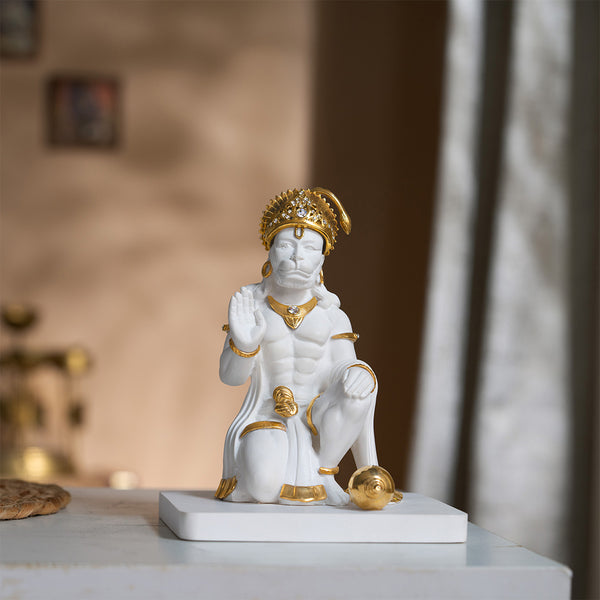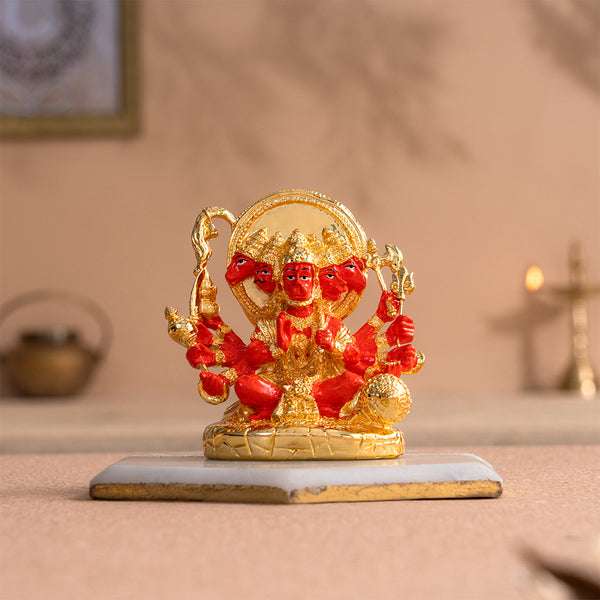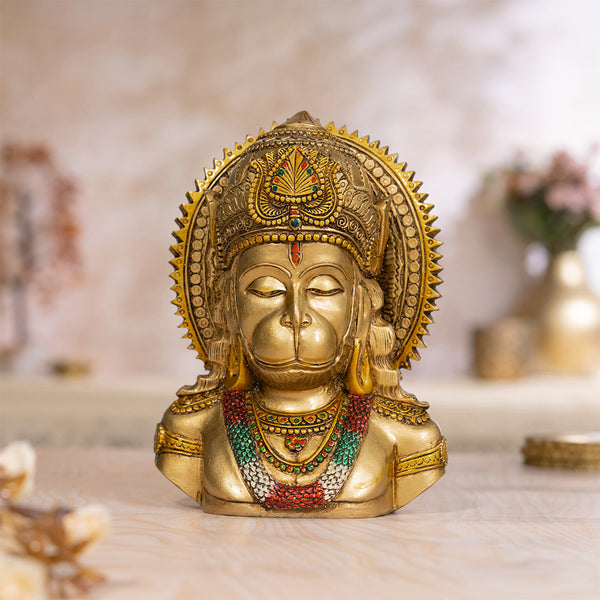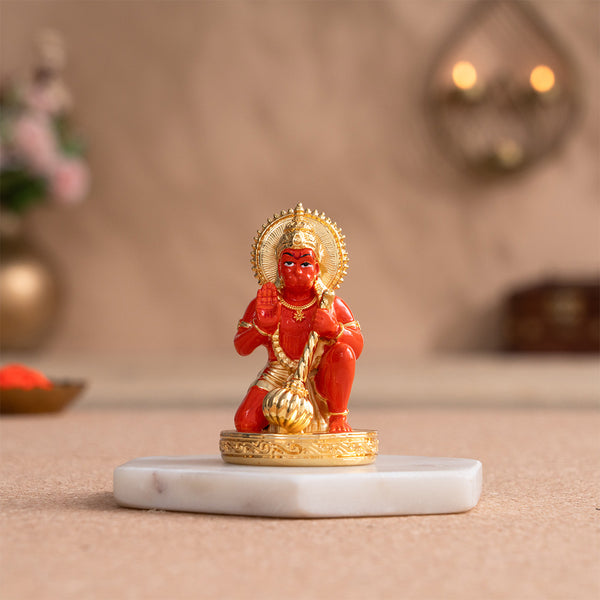What is the Name of Lord Hanuman’s Father? Unraveling the Mysteries of Vayuputra Hanuman
Lord Hanuman, the mighty vanara, holds a special place in our hearts. Whether it’s his unshakable loyalty towards Lord Rama or his unmatched strength, he is a beacon of devotion and courage.
Have you ever wondered about the deeper aspects of Hanuman Ji’s life? One question that pops up often is, Who is the father of Lord Hanuman?
This isn’t just a trivia question, it’s a journey into fascinating legends and beliefs from ancient scriptures. Let’s explore the captivating stories behind Lord Hanuman’s father's name and his divine parentage.
From tales involving the wind god Vayu to the vanara king Kesari, the stories behind his origins are as inspiring as Hanuman himself.

Premium White & Gold Hanuman Ji Kneeling Statue (6.5 Inch)

Panchmukhi Hanuman Statue With Orange Enamel - Gold Plated
Unraveling the Mysteries of Lord Hanuman’s Parentage
When it comes to understanding Lord Hanuman’s lineage, mythology offers a blend of divine intervention and earthly connections, often depicted through the powerful symbolism in Hanuman idols.
Hanuman is often referred to as “Vayu Putra Hanuman” because of his association with Vayu, the wind god. Yet, other tales point to Kesari, a vanara king, as his father. So, who is the true father of Hanuman Ji?
The answer lies in ancient texts like the Vayu Purana and Ramayana. While each narrative provides a unique perspective, they all emphasize one thing, Hanuman’s unparalleled strength, devotion, and divine grace. Let’s delve deeper into these stories to uncover the truth.

The Wind God Vayu: A Popular Belief
One of the most widely accepted accounts of Hanuman’s birth revolves around Vayu, the wind god. According to mythology, Vayu played a pivotal role in bringing Hanuman to life.
It is believed that Anjana, Hanuman’s mother, was a celestial being cursed to live on Earth. She prayed fervently to Lord Shiva for a son who would be as powerful and devoted as him. Pleased with her devotion, Shiva granted her a boon.
When the time came, it was Vayu’s divine intervention that carried Lord Shiva’s blessing to Anjana, resulting in Hanuman’s birth. This act earned him the title “Vayu Putra Hanuman.”
The association with Vayu also explains Hanuman’s superhuman abilities, such as flying and immense speed. Devotees often chant: “Om Namo Bhagavate Anjaneyaya Mahabalaya Swaha” to honor his divine connection with Vayu. This chant highlights Hanuman’s strength and his divine heritage, making him a beloved figure among his devotees.
Kesari and the Curse: An Alternate Tale
Kesari, the brave vanara king, is a pivotal figure in Lord Hanuman’s story, symbolizing earthly virtues like courage, devotion, and determination. Alongside his wife Anjana, Kesari undertook rigorous penance to please Lord Shiva, praying for a child who would bring glory to their lineage. Their devotion was rewarded with the birth of Hanuman, blending divine blessings with human effort.
While Vayu, the wind god, is celebrated for his spiritual role in Hanuman’s creation, Kesari’s presence grounds the narrative in human perseverance and dedication. Legends suggest a curse tied to Kesari, which added to the miraculous circumstances of Hanuman’s birth, underscoring his extraordinary destiny.
The title Kesari Nandan (“son of Kesari”) highlights Hanuman’s connection to his earthly father, honoring the courage, faith, and dharma that Kesari embodied. Devotees often chant “Kesari Laal Ki Jai” to recognize Kesari’s contribution, celebrating both the human and divine aspects of Hanuman’s origin.
Kesari’s story reminds us of the power of unwavering faith and the importance of courage in the face of challenges. His legacy, combined with Vayu’s celestial intervention, shaped Hanuman into a deity who inspires strength, humility, and devotion. Together, they reflect the perfect harmony of divine grace and earthly values, making Hanuman an eternal symbol of inspiration for devotees worldwide.

Meditating Lord Hanuman Antique Idol (8 Inch)

Sinduri Hanuman Murti - Gold Plated
What is the Name of Lord Hanuman’s Father?
So, what is the definitive answer to the question, Who is the father of Hanuman Ji? Well, it depends on which narrative resonates with you the most. While many believe that Vayu, the wind god, is Hanuman’s father due to his divine intervention, others point to Kesari, the vanara king, as his biological father.
The duality of his parentage is beautifully symbolic. Vayu represents divine grace, bestowing Hanuman with unmatched strength, speed, and spiritual energy. On the other hand, Kesari symbolizes earthly values, such as devotion, courage, and perseverance.
Together, they shaped Hanuman into the extraordinary deity we revere today.
This blend of divine and earthly influences is why Hanuman is both Vayu Putra Hanuman and Kesari Nandan. It’s a testament to his unique heritage and the lessons we can learn from both aspects of his parentage.
Conclusion:- Honoring the Reverence for Lord Hanuman

No matter which version of the story you believe, one thing is certain, Hanuman’s life is an eternal source of inspiration. His unparalleled devotion to Lord Rama, his courage in the face of adversity, and his selfless service make him a role model for devotees worldwide.
When we chant “Jai Bajrangbali” or bow before Kesari Nandan, we pay tribute not just to Lord Hanuman’s parentage, but also to the divine virtues he embodies. His story reminds us that true strength is rooted in humility, unwavering devotion, and deep faith.
So the next time someone asks, “What is the name of Lord Hanuman’s father?” you can proudly say:
“He is the son of Kesari, the Vanara king, and Vayu, the wind god a perfect union of earthly valor and divine grace.”
While Kesari is regarded as his biological father, Vayu is revered as his spiritual guide and divine father a symbol of celestial intervention and sacred blessings.






